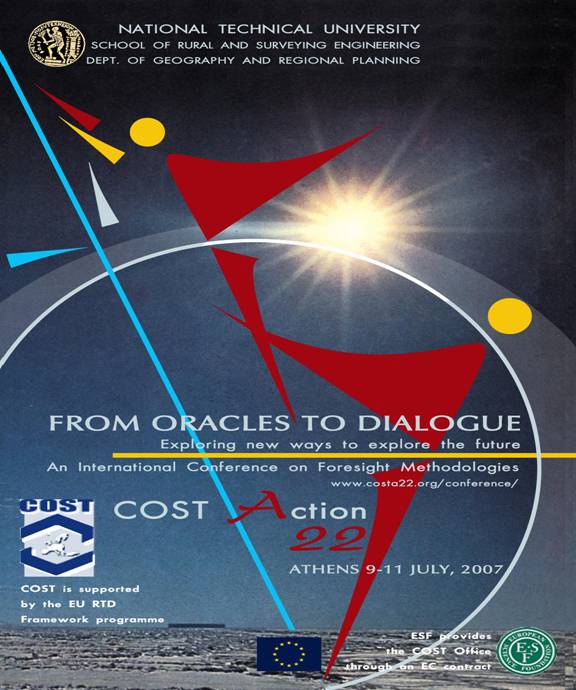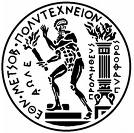
STRAND 1: |
|
STRAND 2: |
|
STRAND 3: |
|
STRAND 4: |
|
CONFERENCE PROGRAMME
July 9 (Day One) |
||
|
|
|
08.30-09.30 |
Registration |
|
|
||
09.30-13.00 |
Plenary |
|
|
||
09-30 – 10.30 |
Chair: Welcome Welcome
Welcome to the Final Conference of COST A22
|
Prof. Maria Giaoutzi Prof. Moutzouris C. - Rector NTUA Prof. Marinos Kavouras – Dean of the School of Rural and Surveying Engineering Prof. Ted Fuller – COST A22 - Chairman
Ministry of Development – General Secretary of Research and Development
|
10.30 – 11:00 |
Chair Introduction to the COST A22
|
Nicolaos Konstantopoulos – Bartolomeo Sapio Ted Fuller |
11.00-11:20 |
Working Group zero (WG0) |
Foresight methodologies; creative tension between disciplines and application |
11:20 – 11.40 |
Working Group one (WG1) |
In search of converging signals on seeds of change methodologies. |
11.40-12.00 |
Coffee break |
|
12.00-12:20 |
Chair: Working Group two (WG2) |
Nicolaos Konstantopoulos – Zia Zardar Commensurability in methods for exploring futures |
12:20-12:40
|
Working Group three (WG3) |
The creation of futures from purposeful interaction |
12:40 – 13:00 |
Feedback |
Summary and response from a founder of COSTA22 |
|
|
|
13.00-14.00 |
Lunch |
|
|
|
|
14.00-15.30 |
Parallel Sessions SLOT I |
STRAND 1: Emergence, replication and anticipation in social systems
|
| STRAND 2: Windows on the seeds of change Chair: Ulrik Joergensen – Rapporteur Sandro Mendonca
|
||
| STRAND 3: Theorizing about Foresight Methodology Chair: Emmanuel Koukios – Rapporteur Bartolomeo Sapio
|
||
| STRAND 4: Policy and Decision Chair: Kristian Borch - Rapporteur Peter De Smedt
|
||
15.30-16.00 |
Coffee Break |
|
16.00-17.30 |
Parallel Sessions SLOT II |
STRAND 1: Emergence, replication and anticipation in social systems (continued) Chair: Ted Fuller, Rapporteur Philip van Notten
|
| STRAND 2: Struggling with systemic approaches Chair: Pierre Rossel – Rapporteur Ulrik Jørgensen
|
||
| STRAND 3: System Content Issues Chair: Ioannis Psarras – Bartolomeo SapioScenario transfer methodology and technology, Bartolomeo Sapio and Enrico Nicolo’
|
||
| STRAND 4: Policy and Decision (continued) Chair: Kristian Borch - Rapporteur Peter De Smedt
|
||
|
||
Evening: Open Social Evening |
||
July 10 (Day Two) |
||
|
||
9.30-11.00 |
Parallel SessionsSLOT III | STRAND 1: Learning methodology from foresight in practice Chair: Zia Zardar - Rapporteur Harry Rothman
|
| STRAND 2: Framing perspectives on futures Chair: Riel Miller – Rapporteur Jari Kaivo-oja
|
||
STRAND 3: Approaches and their Tools (I)Chair: Matthias Ludeke – Rapporteur Bartolomeo Sapio Scenario planning as a tool in foresight exercises: A methodological framework, Stratigea A. and M. Giaoutzi
|
||
| STRAND 4: Learning and Knowledge Chair: Kristian Borch - Rapporteur Tamas Kristóf
|
||
|
|
|
11.00-11.30 |
Coffee Break |
|
|
|
|
11.30-13.00 |
Parallel Sessions SLOT IV |
STRAND 1: Learning methodology from foresight in practice (continued)
|
STRAND 2: Experimenting futures and emergence
|
||
| STRAND 3: Approaches and their Tools (II) Chair: Ana Morato – Rapporteur Jan Erik Karlsen Opportunities for combining quantitative and qualitative approaches in scenario-building (The experience of the “Estonia 2010” project), Erik Terk
|
||
STRAND 4: Learning and Knowledge (continued)
STRAND 4: Dissemination
|
||
|
|
|
13.00-14.00 |
Lunch |
|
|
|
|
14.00-15.30 |
Parallel SessionsSLOT V | STRAND 1 and STRAND 2: Workshop on Futures literacyChair: Riel Miller, Ulrik Jørgensen and Pierre Rossel |
| Organised by Riel Miller, Ulrik Jørgensen and Pierre RosselOpen to all conference participants | ||
| STRAND 3: Chair: John Mourmouris - Rapporteur Peter Alacs Technology foresight as a policy tool for sustainable development in the knowledge society: Lessons from the Greece 2001-2021 Foresight Exercise, Emmanuel G. Koukios Development of foresight methodology in Poland verified by the example of nanotechnology, Anna Sacio-Szymanska, Adam Mazurkiewicz and Beata Poteralska Towards a classification of tools and approaches applicable in foresight studies, Jan E. Karlsen |
||
| STRAND 4: Participation Chair : Kristian Borch - Rapporteur Serge Stalpers
|
||
|
||
16.00-17.30 |
Parallel Sessions SLOT VI | STRAND 1 and STRAND 2: Workshop on Futures literacy (continued) Chair: Riel Miller, Ulrik Jørgensen and Pierre Rossel |
| Organised by Riel Miller, Ulrik Jørgensen and Pierre RosselOpen to all conference participants | ||
| STRAND 3: Chair: Jan Erik Karlsen - Rapporteur Ana Morato Willingness-to-use models for climate policy, Serge Stalpers
|
||
| STRAND 4: Participation (Continued) Chair: Kristian Borch - Rapporteur Serge Stalpers
Chair: Kristian Borch - Rapporteur Michael Søgaard Jørgensen
|
||
|
||
16.30-17.00 |
Organization Meeting | Working Group: Leaders and rapporteurs |
17.00-18.00 |
Executive Management Committee | |
|
||
20.00-23.00 : Conference Dinner in Varkiza - Athens |
||
|
||
July 11 (Day Three) |
||
|
||
09.30-11.30 |
Parallel SessionsSLOT VII | STRAND 1: Workshop: Paths to methodological development in foresight and futures, what is needed now? Chair: Ted Fuller - Rapporteur Atilla Havas |
| STRAND 2: Cases on envisioning futures Chair: Kostis Koutsopoulos - Rapporteur Ruuta Ruttas-Kuttim
|
||
| STRAND 4: Vision (continued) Chair: Kristian Borch - Rapporteur Michael Søgaard Jørgensen
|
||
|
||
11.00-11.30 |
Coffee Break | |
|
||
11.30-13.00 |
Plenary | Closing and Future Chair: Peter De Smedt – Rapporteur Michael Søgaard Jørgensen Reports from chairs and rapporteurs from each Strand. The concluding Key Messages of COSTA22.Discussion: The Futures of Foresight: One Community or Many? Close of conference - Ted Fuller and Maria Giaoutzi |
IGU, Heritage, Planning and eParticipation: The Evolving Forms of Information Society, NTUA - Athens, July 3-6, 2011
COST-A22, FROM ORACLES TO DIALOGUE Exploring new ways to explore the future, NTUA - Athens, July 9-11, 2007
Τουρισμός και Περιφερειακή Ανάπτυξη, Πολυτεχνειούπολη Ζωγράφου, 21 Ιανουαρίου, 2005
Tourism, Telecommunications and Regional Development, Samos, October 23-25, 1997
Informatics and Regional Development Delphi, 1984
